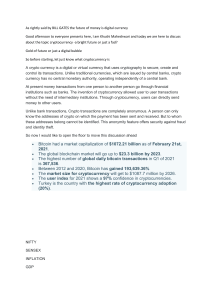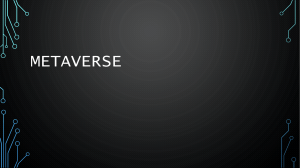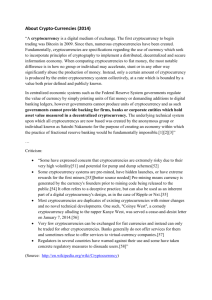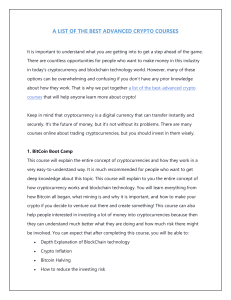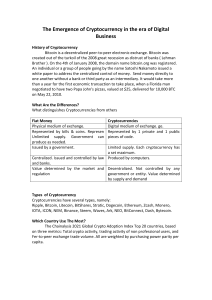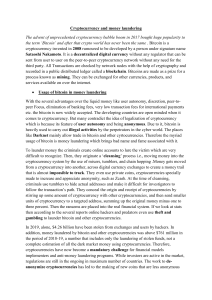Cryptocurrency Explained: Blockchain, Bitcoin, and Digital Currency
advertisement
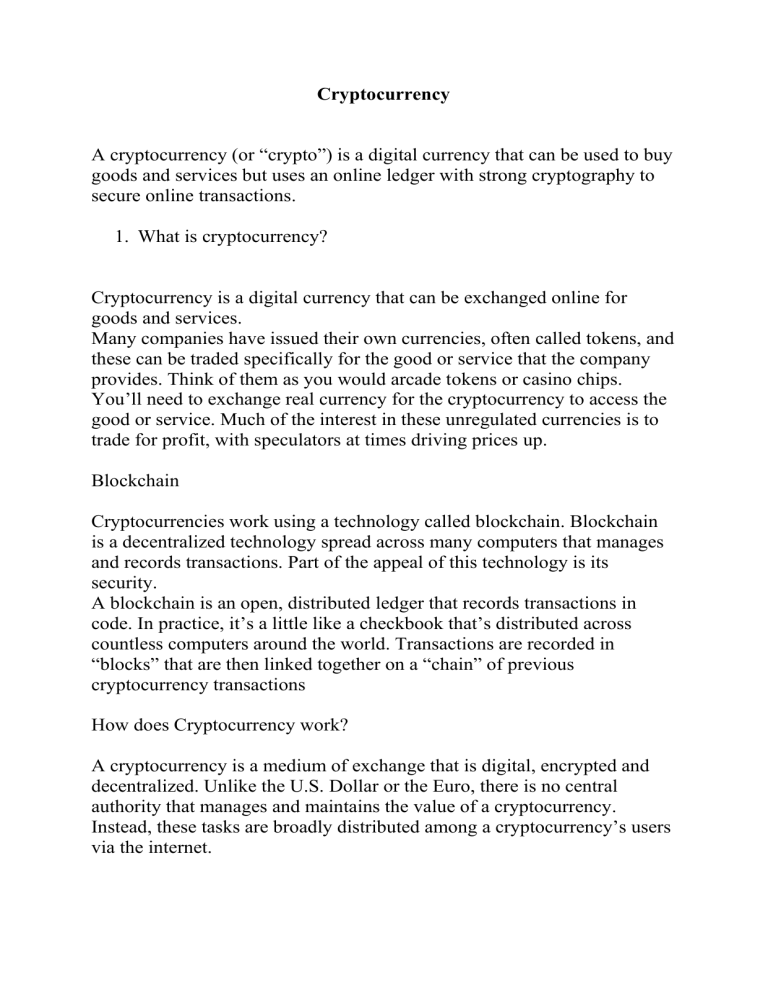
Cryptocurrency A cryptocurrency (or “crypto”) is a digital currency that can be used to buy goods and services but uses an online ledger with strong cryptography to secure online transactions. 1. What is cryptocurrency? Cryptocurrency is a digital currency that can be exchanged online for goods and services. Many companies have issued their own currencies, often called tokens, and these can be traded specifically for the good or service that the company provides. Think of them as you would arcade tokens or casino chips. You’ll need to exchange real currency for the cryptocurrency to access the good or service. Much of the interest in these unregulated currencies is to trade for profit, with speculators at times driving prices up. Blockchain Cryptocurrencies work using a technology called blockchain. Blockchain is a decentralized technology spread across many computers that manages and records transactions. Part of the appeal of this technology is its security. A blockchain is an open, distributed ledger that records transactions in code. In practice, it’s a little like a checkbook that’s distributed across countless computers around the world. Transactions are recorded in “blocks” that are then linked together on a “chain” of previous cryptocurrency transactions How does Cryptocurrency work? A cryptocurrency is a medium of exchange that is digital, encrypted and decentralized. Unlike the U.S. Dollar or the Euro, there is no central authority that manages and maintains the value of a cryptocurrency. Instead, these tasks are broadly distributed among a cryptocurrency’s users via the internet. “Imagine a book where you write down everything you spend money on each. “Each page is similar to a block, and the entire book, a group of pages, is a blockchain.” With a blockchain, everyone who uses a cryptocurrency has their own copy of this book to create a unified transaction record. Software logs each new transaction as it happens, and every copy of the blockchain is updated simultaneously with the new information, keeping all records identical and accurate. To prevent fraud, each transaction is checked using one of two main validation techniques: proof of work or proof of stake. 2. How many cryptocurrencies are there? More than 6,700 different cryptocurrencies are traded publicly. And cryptocurrencies continue to proliferate, raising money through initial coin offerings, or ICOs. The total value of all cryptocurrencies on April 13, 2021, was more than $2.2 trillion and the total value of all bitcoins, the most popular digital currency, was pegged at about $1.2 trillion. What is Bitcoin? (most popular) Bitcoin is a decentralized digital currency that you can buy, sell and exchange directly, without an intermediary like a bank. Bitcoin’s creator, Satoshi Nakamoto, originally described the need for “an electronic payment system based on cryptographic proof instead of trust.” Each and every Bitcoin transaction that’s ever been made exists on a public ledger accessible to everyone, making transactions hard to reverse and difficult to fake. That’s by design: Core to their decentralized nature, Bitcoins aren’t backed by the government or any issuing institution, and there’s nothing to guarantee their value besides the proof baked in the heart of the system. “The reason why it’s worth money is simply because we, as people, decided it has value—same as gold,” says Anton Mozgovoy, co-founder & CEO of digital financial service company Holyheld. Since its public launch in 2009, Bitcoin has risen dramatically in value. Although it once sold for under $150 per coin, as of March 1, 2021, one Bitcoin now sells for almost $50,000. Because its supply is limited to 21 million coins, many expect its price to only keep rising as time goes on, especially as more large, institutional investors begin treating it as a sort of digital gold to hedge against market volatility and inflation. Discussion part: - Do you use bitcoin or any other cryptocurrency? Do you have a wallet? Use it for fun or as an early investment? Do you believe this is the future (replace banks)? Planning on investing but too risky? Do you believe in it as a new currency?

